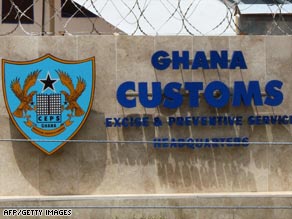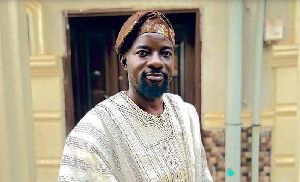NPP's $5M World Bank loan for Asanteman and Akyem Traditional Councils …
Mr. Kwabena “Squealer' Agyepong, the NPP spin-doctor extraordinaire, the one who, in the absence of Jake Obetsebi-Lamptey, the Minister for Tourism and the Modernisation of the Capital who is not known to have any educational or academic qualifications, manufactures all the lies that the NPP has been telling for the over two years that they have been in power, has dared us.
He has dared to deny our story that the NPP Government has entered into a secret deal with the World Bank to secure funds for some traditional authorities in furtherance of the Party's political agenda to create ethnic hegemony.
We proceed to prove Kwabena 'Squealer' Agyepong a liar by responding to each of the points in his statement of denial as reported on the front page of the Daily Graphic of Saturday, May 31, 2003. For this purpose, we have reproduced photocopies of the Summary page and page 27 from the 46-page secret Project Appraisal document of the Ghana Government-World Bank Agreement.
Kwabena Agyepong has denied that the Government has entered into any such Agreement.
Ghana Palaver says this is a lie. The NPP Government has entered into an Agreement with the World Bank for the Bank to lend SDR3.20 million (US$5.0 million equivalent) to the Government of Ghana for the exclusive use of the Asanteman Council and the Akyem Abuakwa Traditional Council.
The Agreement is contained in World Bank document Report No. 25155-GH entitled “Proposed Learning and Innovation Lending (Credit) (LIL Project) in the amount of SDR3.7 million (US$5.0 million equivalent) to the Republic of Ghana for the Promoting Partnerships with Traditional Authorities Project” dated March 10, 2003.
Kwabena Agyepong says the idea of the World Bank's partnership with the traditional authorities was incorporated into Ghana's Country Assistance Strategy (CAS) in June 2000 for the year 2000 and 2003 and that the document for this purpose was prepared by the NDC Government and the World Bank Group under the direction of the then Minister of Finance Mr. Kwame Peprah and his Deputy Mr. Victor Selormey.
Ghana Palaver says this is a lie. The World Bank's Country Assistance Strategy document that Kwabena Agyepong refers to is World Bank document No. 20185-GH dated June 29, 2000. Paragraph 43 of that document deals with 'Promoting Partnerships with Traditional Authorities'. It is an agreement in principle for the World Bank to give support to traditional authorities. It does not mention which traditional authorities were to benefit. It does not mention the amount of money involved.
Indeed our investigations have revealed that the NDC's plan was to put the whole matter before the National House of Chiefs and let the Project develop from there. It is offensive for Kwabena Agyepong and his NPP to instruct judges to put the NDC officials in prison from where they cannot defend themselves, and then misuse their names to try to defend the NPP Government's indefensible actions.
Kwabena Agyepong says under the strategic document, the World Bank decided to give the traditional authorities a loan of $5 million to the Asanteman Council and the Akyem Abuakwa Traditional Council.
Ghana Palaver says this is a lie. The decision to give $5 million to the Asanteman Council and the Akyem Abuakwa Traditional Council is not under the Country Assistance Programme document No. 20185-GH. In fact, the CAS normally does not contain such details; it contains agreements in principle. The decision to give $5 million to the two Traditional Councils is contained in the LIL Project document No.25155-GH dated March 10, 2003 and signed between the NPP Government and the World Bank.
The NPP Government selected the Asanteman Council and the Akyem Abuakwa Traditional Council as the traditional authorities to benefit; the NPP Government negotiated the amount, and the NPP Government signed the Agreement.
Kwabena Agyepong says what the NPP Government has done is to prevail on the World Bank to deal directly with the traditional authorities and to convert the loan into a grant.
Ghana Palaver says this is a lie. First, the World Bank seldom gives grants. Second, as is obvious from the photocopy of the Project Summary page of the Agreement published on this page, the Agreement is not a grant, contrary to Kwabena Agyepong's lie. It is a loan, and it is described as such and called the “Learning and Innovation Lending Loan (LIL) for US$5 million”. It is repayable over 50 years including 10 years grace period, 40 years maturity, a commitment fee of 0.50%, and a service charge of 0.75%.
The Borrower is the Government of Ghana, the lender is the IDA of the World Bank, and the responsible agency is the Asanteman Council Secretariat, Manhyia Development Unit, Manhyia Palace, P. O. Box 285, Kumasi, Ghana. In fact, Akyem Abuakwa Traditional Council, Kyebi Ahenfie Secretariat, Kibi-E/R, Ghana, PMB 109, Cantonments, Accra, Ghana, is listed as 'Other Agency' in the Agreement, thus confirming Ghana Palaver's earlier contention that the Project is basically an Ashanti Project and that the Akyem Abuakwa Traditional Council was added as an afterthought.
The contact persons under the Agreement are: for the Asanteman Council, K. K. Mensah, the Managing Director under whom the Ghana Co-operative Bank collapsed, and for the Akyem Abuakwa Traditional Council, Dr. Angela Ofori-Atta, recently appointed Deputy Minister of Manpower Development and Employment, a clinical psychologist and wife of Ken Ofori-Atta of Databank Financial Services Ltd.
The Team Leader is Kofi Boateng-Agyen who was on Metro TV's Breakfast Show last week trying unsuccessfully to defend the ethnically biased and indefensible Project.
Kwabena Agyepong says there is nothing secret about the Agreement.
Ghana Palaver says that is a lie. There is everything secret about the Agreement. Contrary to the impression sought to be created by Kwabena Agyepong that it was the NDC that selected the Asanteman Council and the Akyem Abuakwa Traditional Council, it will be seen from page 27 of the Agreement, a photocopy of which is published in this paper, that the first World Bank Mission (identification) - and it is at this stage that the beneficiary institutions are identified - came to Ghana on February 24, 2002, more than one year after the NDC Government had left office and when the NPP Government was firmly in control. Where do Kwame Peprah and Victor Selormey who they have jailed in shameful circumstances come into the matter?
Again as can be seen from page 27 of the Agreement, the World Bank Appraisal Mission, which came after the Identification Mission, departed Ghana on 3rd August 2002.
Negotiations began on 27th January 2003, between the NPP Government and the World Bank.
The loan is planned to become effective on 15th June 2003.
In all these processes, Parliament has not been made aware. We understand the Agreement was taken to Cabinet but was shot down because Cabinet felt it would raise ethnic tensions and also that the traditional authorities were not part of the governmental system. Nevertheless, 'somebody up there' managed to ignore Cabinet and got the Minister of Finance to proceed with the Agreement. Counting today, there are only 11 days left for the loan to become effective! If this is not secrecy, then we do not know what Kwabena Agyepong's understanding of secrecy is.
Kwabena Agyepong says that the talk about ethnic agenda is a fallacy and distortion that has to be condemned in no uncertain terms.
Ghana Palaver says that is a lie. The three persons in Ghana best placed to know about the LIL facility and therefore promote the loan agreement for their Traditional Councils are President John Agyekum Kufuor who is the authority that gives the go-ahead for negotiations to begin and he is an Ashanti; the then Attorney General who has to give the Legal Opinion before the loan will be signed by the World Bank, and he is not just an Akyem, he is a royal of the Akyem Abuakwa stool; and Mr. Yaw Osafo-Maafo, the Minister of Finance who would sign the loan and who is the authorising officer for the loan. He is also an Akyem.
With these dramatis personae, is it a fallacy and a distortion for the Ghana Palaver to conclude that there is an ethnic agenda for which the paper “has to be condemned in no uncertain terms?”
Come again, Kwabena 'Squealer' Agyepong.
| WORLD BANK DOCUMENT: Promoting Partnerships with Traditional Authorities Project |
The main purpose of the Promoting Partnerships with Traditional Authorities Project is to test in a limited number of areas approaches to:
2) help focus the contributions/influence of Traditional Authorities (TA) in socio-economic development. Component 1 seeks to strengthen the capacities of the traditional authorities (chiefs, queenmothers, and village headpersons) and communities in the Asanteman Council areas, and the Akyem Abuakwa Traditional Council areas to effectively participate in activities to improve health and fight HIV/AIDS in their communities. This will be done through regular workshops and seminars for the traditional authorities, community volunteers and community members. Component 2 provides resources for rehabilitating basic primary education facilities in selec! t rural and deprived areas in the Asanteman Council (AC) community; and design of a partnership method between traditional authorities and government in providing quality basic education. Component 3 improves the financial and management capabilities of the two councils' respective secretariats; and the capacities of the traditional authorities who are members of these two councils, on decentralization and community development issues. It establishes a monitoring and evaluation system to ensure feedback. Component 4 provides support to both councils to improve their communities' ability to carry out programs that help them preserve and benefit from their cultural heritage, through, for example, the development of educational activities/curriculum in schools on cultural heritage, linkages to environmental degradation, and private sector-community business partnerships to set up, for example, eco-tourism projects. Support will also update the inventory of cultural heritage ar! tifacts/practices; and assist traditional authorities in reviewing the operations of the traditional law courts system with the view to reducing the incidence of chieftaincy disputes, land litigation, etc. The study also serves, among other things, to identify needs for revision, codification, and dissemination of traditional laws, and identification of ways to increase the accessibility and effectiveness of traditional law courts.** |
| ||||||||||||||||||||||||||||||||||||||||||||||||||||||||||||||||||||||||||||













